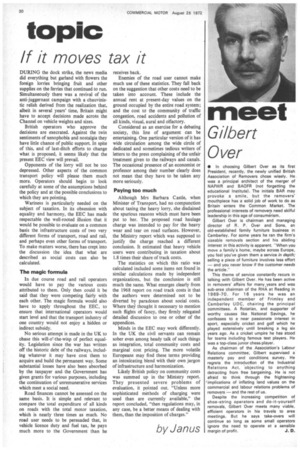topic
Page 32

If you've noticed an error in this article please click here to report it so we can fix it.
If it moves tax it
DURING the dock strike, the news media did everything but garland with flowers the foreign lorries bringing fruit and other supplies on the ferries that continued to run. Simultaneously there was a revival of the anti-juggernaut campaign with a chauvinistic relish derived from the realization that, albeit in several years' time, Britain might have to accept decisions made across the Channel on vehicle weights and sizes.
British operators who approve the decisions are execrated. Against the twin sentiments of xenophobia and nostalgia they have little chance of public support. In spite of this, and of last-ditch efforts to change what is proposed, it seems likely that the present EEC view will prevail.
Opponents of the lorry will not be too depressed. Other aspects of the common transport policy will please them much more. Operators should begin to look carefully at some of the assumptions behind the policy and at the possible conclusions to which they are pointing.
Wariness is particularly needed on the subject of taxation. In its obsession with equality and harmony, the EEC has made respectable the well-rooted illusion that it would be possible to evaluate on a common basis the infrastructure costs of two very different forms of transport, road and rail, and perhaps even other forms of transport. To make matters worse, there has crept into the discussion the idea that what are described as social costs can also be calculated.
The magic formula In due course road and rail operators would have to pay the various costs attributed to them. Only then could it be said that they were competing fairly with each other. The magic formula would also have to apply throughout the EEC, to ensure that international operators would start level and that the transport industry of one country would not enjoy a hidden or indirect subsidy.
No serious attempt is made in the UK to chase this will-o'-the-wisp of perfect equality. Legislation since the war has written off the historic debt of the railways, including whatever it may have cost them to acquire and build the permanent way. Some substantial losses have also been absorbed by the taxpayer and the Government has given grants for various purposes, including the continuation of unremunerative services which meet a social need.
Road finances cannot be assessed on the same basis. It is simple and relevant to compare the -total expenditure of all kinds on roads with the total motor taxation, which is nearly three times as much. No road user needs to be persuaded that, in vehicle licence duty and fuel tax, he pays much more to the Government than he
receives back.
Enemies of the road user cannot make much use of these statistics, They fall back on the suggestion that other costs need to be taken into account. These include the annual rent at present-day values on the ground occupied by the entire road system; and the cost to the community of traffic congestion, road accidents and pollution of all kinds, visual, aural and olfactory.
Considered as an exercise for a debating society, this tine of argument can be entertaining. One particular version of it has wide circulation among the wide circle of dedicated and sometimes tedious writers of letters to the press complaining of the unfair treatment given to the railways and canals. The occasional presence of an economist or professor among their number clearly does not mean that they have to be taken any more seriously. • Paying too much Although Mrs Barbara Castle, when Minister of Transport, had no compunction about taxing the heavy lorry, she disdained the spurious reasons which must have been put to her. The proposed road haulage charge was intended to pay for the heavy wear and tear on road surfaces. However, the Ministry report which was supposed to justify the charge reached a different conclusion. It estimated that heavy vehicle users were contributing in taxation about 1.8 times their share of track costs.
The statistics on which this ratio was calculated included some items not found in similar calculations made by independent organizations, but the conclusion is still much the same. What emerges clearly from the 1968 report on road track costs is that the authors were determined not to be diverted by paradoxes about social costs. Where the3). thought it necessary to mention such flights of fancy, they firmly relegated detailed discussion to one or other of the appendices.
Minds in the EEC may work differently. In the UK the civil servants can remain sober even among heady talk of such things as integration, total community costs and marginal cost pricing. The more volatile Europeans may find these terms providing an intoxicating blend with their own jargon of infrastructure and harmonization.
Likely British policy on community costs was summed up in the Ministry report. They presented severe problems of evaluation, it pointed out. "Unless more sophisticated methods of charging were used than are currently available," the report concluded, "then regulations may, in any case, be a better means of dealing with them, than the imposition of charges."
by Janus




















































































